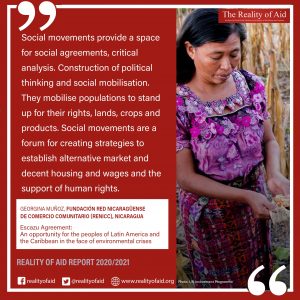Escazu Agreement: An Opportunity for the Peoples of Latin America and the Caribbean in the Face of Environmental Crises
Georgina Muñoz, RENICC, Nicaragua
Perhaps the greatest challenge in our world today is the need to identify and implement solutions to
our planet’s latent environmental crises. Many international conferences have been convened to
discuss these issues, but these meetings have often had disappointing results. While our whole
planet is experiencing the impact of climate change, the poorest countries are particularly
vulnerable and likely to suffer the most. The recent COVID-19 pandemic has significantly worsened
an already precarious situation.
The care and protection of the natural environment has become a growing priority for the global
political agenda. To support this, it is necessary to have effective multilateral agreements in place at
the global and regional level. The 2030 Agenda for Sustainable Development and the Escazú
Agreement for Latin America and the Caribbean are two such initiatives.
The Escazú Agreement (adopted in March 2018) is the first environmental treaty in the region and
the world to include provisions about environmental human rights defenders. Negotiated by the
States with meaningful civil society and general public engagement, this Agreement confirms the
value of regional dimensions of multilateralism for sustainable development.
This Treaty is groundbreaking. It makes a major contribution to democratic governance by
guaranteeing the right to gender equality, a healthy environment and sustainable development,
which is centered on people and vulnerable groups. It establishes urgent priorities for environmental
management and protection from a regional perspective; regulates rights to access information and
to public participation; and advocates for justice in the sustainable use of natural resources. It
supports biodiversity conservation for the establishment of greater trust, stability and transparency
in our societies.
The Agreement prioritizes all-encompassing sustainable development. The mechanisms contained in
the Agreement can serve as a basis for regulations to prevent, control and limit production systems
that are motivated by profit maximization ambitions, regardless of their risk to the environment.
The Agreement has many opponents who perceive it as a serious threat. They are polarizing
discussions and are lobbying for States not to add their support and signatures to this Agreement.
This dissension is causing social polarization in some countries such as Chile, Colombia, Paraguay and
Costa Rica.
It is important to clarify that the Escazú Agreement is an agreement signed by States, but it does not
establish substantive obligations and rights between States. Instead, most of its provisions (Articles 1
to 10) focus on a series of Obligations and Commitments that each State, within its territory and in
relation to the people living under its jurisdiction, undertakes to implement. The entry into force of
this instrument is urgently needed.
Just as important is the need to address past wrongs, to re-establish citizen and indigenous people’s
participation in environmental justice. Latin America has a violent history to account for, with the highest number of killings of environmental and community leaders. The entry into force of the
Escazú Agreement sends a strong message to the national and international community about our
region's commitment to human rights in environmental issues.
New social actors, who are mobilizers of change and transformation, are being empowered in the
LAC region. Social movements provide a space for social agreement, critical analysis, construction of
political thinking and social mobilization. The integration of social movements is, of course, complex
and dynamic. It requires the integration of the interests and views of organizations across sectors. It
is based on democratic principles and the realization of, peace, social justice, sustainable
development, multicultural identities, self-determination, sovereignty, justice and solidarity
principles.
Challenges for Governments:
Address the urgent need to raise the region’s level of ethical commitment and political will
in environmental issues;
Support ownership of international, regional, sectoral Agreements by governments;
Clearly define environmental policies and development strategies; and
Engage citizens in political dialogue.
For Development Cooperation:
Accompany ownership, harmonization, alignment and accountability processes with a view
to strengthening governments’ capacities towards the implementation of the Escazú
Agreement;
Provide resources towards environmental policy implementation;
Implement South-South, multilateral and bilateral cooperation linked to SDGs; and Reshape development cooperation in Latin America.
Reshape development cooperation in Latin America.
For Sectors, Movements, and Civil Society Organizations:
Urge the States of LAC that have not yet ratified the Agreement to provide their countries
with a robust instrument that allows progress in democracy and environment governance;
Create campaigns and social mobilization based on awareness raising and dissemination;
Accompany fully informed Human Rights Defenders in the management of the
environmental agenda; and
Reconnect with the youth of the Americas.
